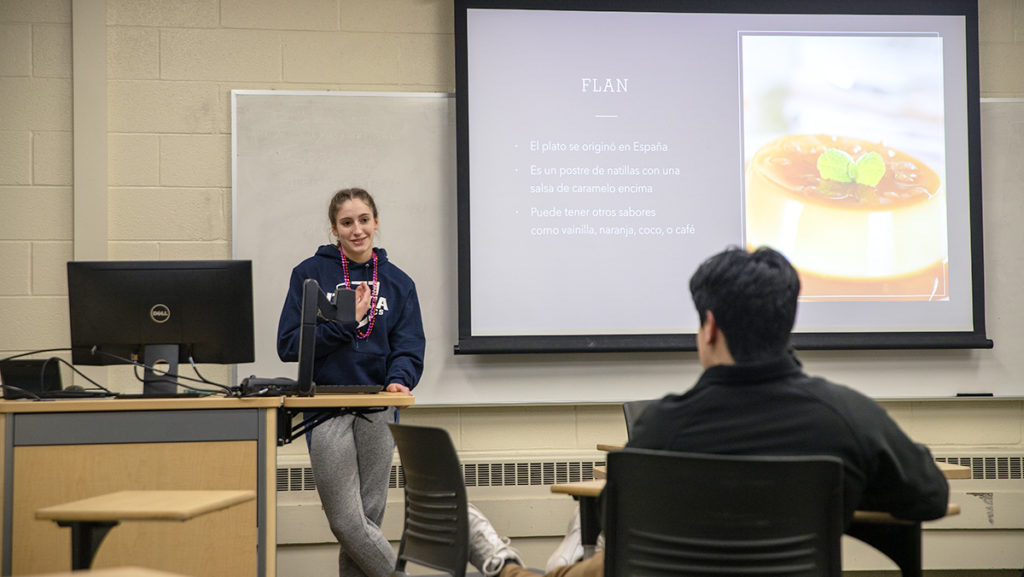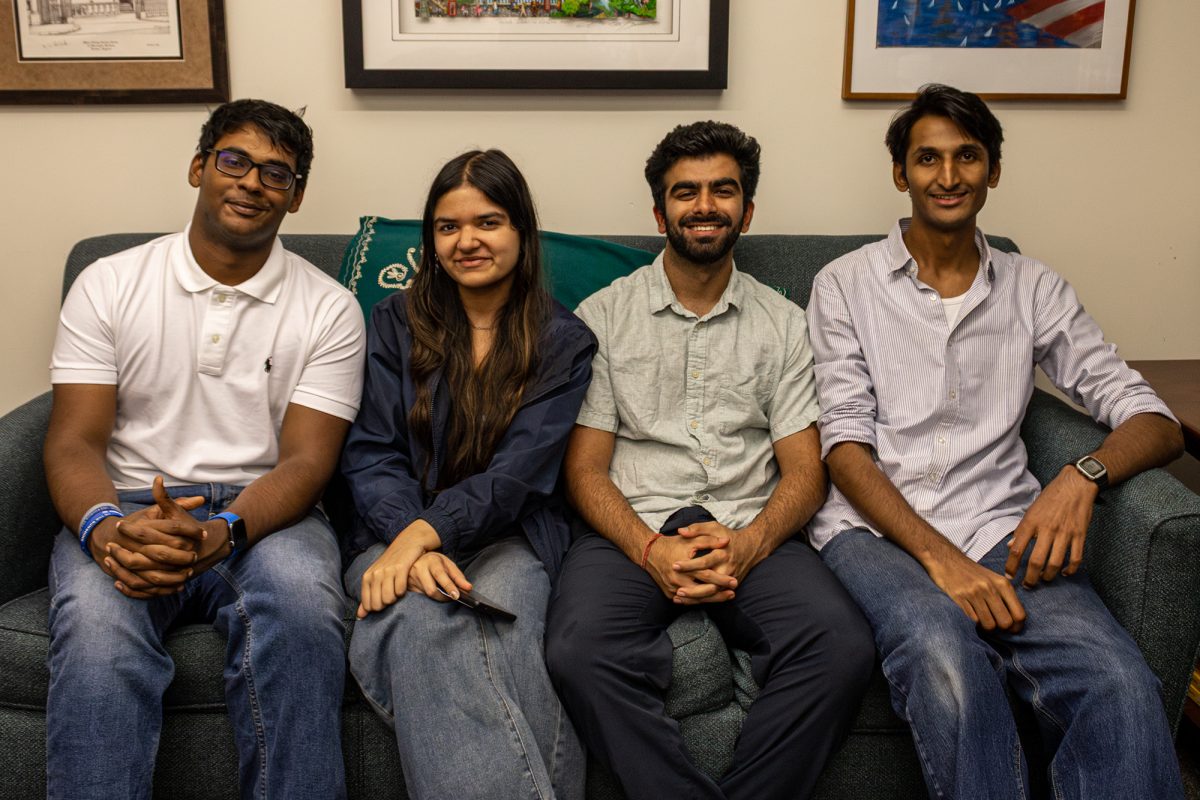The soft sounds of chatter fly through the air as Ithaca College students talk in their learned language about everything from movies and pop culture to world events to the dating scene in Ithaca during weekly language conversation group sessions on campus.
The Italian and Spanish conversation groups on campus, known as Chiacchiere, which means chat or talk in Italian, and Tertulias, which means social gatherings or meetings to discuss current events in Spanish, consist of weekly sessions in which students are able to speak in the language they are learning in a more informal setting than their classes. Chiacchiere and Tertulias are the only two language groups currently running for the 2022–23 academic year. In the past, there have also been French and German language groups.
Marella Feltrin-Morris, associate professor in the Department of World Languages, Literatures, and Cultures, oversees Chiacchiere. Feltrin-Morris, who has been teaching at Ithaca College since 2005, said the group, formed by members of the Italian faculty, has been around for as long as she has been at the college.
The purpose of the organization is to allow students opportunities they would not otherwise have to practice Italian.
“Obviously if we were in Italy or in a place with a significant Italian population, the students would go out of the classroom and immediately have a chance to speak,” Feltrin-Morris said. “Being here, it’s clearly not as easy, so this will give students the opportunity to talk about either the class, material or practice conversation on various topics on a regular basis.”
The Tertulias have a similar aim. According to an Intercom post from Feb. 17, advertising the Tertulias, the weekly conversations are low-stakes and allow students to build upon the knowledge they have already gained at the college in a comfortable, more relaxed environment.
Gladys Varona-Lacey, professor in the Department of World Languages, Literatures, and Cultures, is the organizer and advisor for the Spanish student-led discussions. She said that the Tertulias are a way to supplement the learning that students are doing in the classroom.
“[The purpose for students is] to enrich what they have learned and help them attain fluency,” Varona-Lacey said.
Varona-Lacey said there is no requirement for students learning Italian to attend Chiacchiere. For 200-level Spanish courses, students must attend at least four Tertulias by the end of the semester. Although, Varona-Lacey also said that any students interested in participating are welcome.
“Tertulias have always been open to everyone … don’t pass up a wonderful opportunity,” Varona-Lacey said.
Both groups are led by students who are native speakers of the languages this semester. Members of Chiacchiere have not always been able to find native Italian-speaking students to lead the group, but this semester they did, Feltrin-Morris said. The Tertulias have always been led by native Spanish speakers and will continue to be during Spring 2023. The current discussion leaders are senior Alonso Gonzalez Reynaud who leads the 300-level Tertulias and senior Isabella Orrego Madrinan who leads the 200-level Tertulias.
Gonzalez Reynaud has been involved with the Tertulias since Fall 2020. Prior to his current position leading the 300-level group for advanced Spanish students, he led the 200-level group for intermediate students. Which group that students participate in depends on either their level of fluency or the corresponding level of the Spanish class they are taking. Chiacchiere, on the other hand, is not separated by levels. Gonzalez Reynaud said he particularly appreciates meeting and becoming acquainted with new students.
“Just getting to know the people and just creating new connections is what I enjoy the most,” Gonzalez Reynaud said. “I think it’s what’s kept me around for this long.”
Gonzalez Reynaud also said that it is a welcoming learning environment for students of all levels and abilities of Spanish speaking.
“Honestly, we don’t discriminate here,” Gonzalez Reynaud said. “If you’re having trouble somewhere, I always step in to help. … It’s very relaxed. Some students even come here that don’t even know how to speak Spanish and we still end up having a good time.”
Orrego Madrinan began working with the 200-level students at the start of the Fall 2022 semester. She said she found it to be a positive experience because she enjoys working with other students.
“I genuinely like just being able to speak Spanish with other people and have them engage or teach other people the language,” Orrego Madrinan said.
Orrego Madrinan said that students should take advantage of the learning opportunities available to them.
“I feel like it’s generally nice that people have this space to be able to talk and then learn,” Orrego Madrinan said. “I’m always telling [students] . . . why are you learning Spanish if you’re not able to speak. You learn Spanish to travel to a Spanish-speaking place and if you’re not able to speak it, what, you’re just going to be able to sit and read the menu and that’s it?”
Camilo Malagon, assistant professor in the Department of World Languages, Literatures, and Cultures and co-director of the Latin American and Caribbean Studies Program, said he sees these conversation sessions as a great opportunity for students to become more familiar with the language. He participated in a Portuguese language group during his time as a graduate student at Tulane University and feels that this type of learning benefits students in a tangible, noticeable way.
“I’ve lived that experience, learning a language not in a context where it is spoken all the time,” Malagon said. “If students are really committed to learning the language [this is a] great opportunity and they should take advantage of it.”
Chiacchiere meets on Tuesdays from 1 to 2 p.m. and Wednesdays from 4 to 5 p.m. in IC Square. Tertulias for the 200-level courses meet Tuesdays at 12:10 p.m. and Thursdays at 7 p.m. in Friends 205. The 300-level group meets on Tuesdays at 7 p.m. and Thursdays at 12:10 p.m., also in Friends 205.














